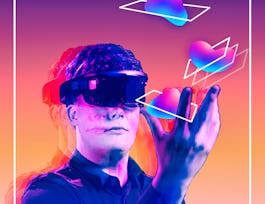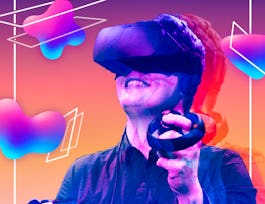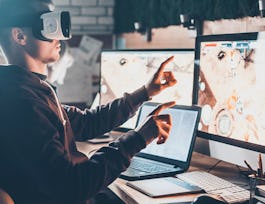This third course in the XR for Everybody specialization is geared toward the technical development of XR experiences. The course provides learners with a more technical mental model of XR technologies and the tools to approach XR development with confidence. It walks through the stages of development for both VR and AR projects, introducing the main XR development platforms as well as the key methods and tools. This third course also helps learners infer advanced XR requirements from physical/digital prototypes and teaches them how to differentiate major technical concerns, estimate development costs, and plan research necessary to advance XR.


Developing AR/VR/MR/XR Apps with WebXR, Unity & Unreal
This course is part of Extended Reality for Everybody Specialization
Taught in English
Some content may not be translated

Instructor: Michael Nebeling
9,657 already enrolled
Included with 
Course
(75 reviews)
What you'll learn
Create basic and immersive VR scenes in WebXR or Unity.
Create marker-based and marker-less AR scenes in WebXR or Unity.
Understand fundamental concepts and techniques for advanced XR applications.
Develop XR applications with ethics, accessibility, and privacy in mind.
Skills you'll gain
Details to know

Add to your LinkedIn profile
4 quizzes
Course
(75 reviews)
See how employees at top companies are mastering in-demand skills

Build your subject-matter expertise
- Learn new concepts from industry experts
- Gain a foundational understanding of a subject or tool
- Develop job-relevant skills with hands-on projects
- Earn a shareable career certificate


Earn a career certificate
Add this credential to your LinkedIn profile, resume, or CV
Share it on social media and in your performance review

There are 4 modules in this course
This first module will cover three main approaches to XR development: WebXR, Unity, and Unreal. Each approach requires different development tools, programming languages, and technical skills. They also differ in the fidelity and quality that can be achieved and in how many devices and users can be reached with each. In addition to getting a fundamental overview of XR development platforms and tools, a main goal this week is to make the jump from 2D to 3D: many of our learners will be familiar with web and mobile development, but 3D development is quite different. In the honors track, I will guide you through the creation of your first 3D scene using WebXR, Unity, or Unreal. I will also provide first steps instructions in each of them, allowing you to analyze and compare before choosing your approach and tools.
What's included
14 videos18 readings1 quiz2 app items4 discussion prompts
This second module will focus on the development of VR applications. We will learn what it takes to create a virtual reality, about menus and navigation techniques in VR, as well as object selection and manipulation. I’ll share various examples that I have implemented using WebXR to illustrate the concepts. I will also cover approaches in Unity and Unreal. You will also see me give demos directly in VR to better understand how navigation and interactions work in VR. Many of the lessons are rooted in a VR design case study inspired by the Detroit Zoo, which my student Kara Dailey and I created specifically for this XR MOOC. In the honors track, I will guide you through the creation of your first VR scene using A-Frame, Unity, or Unreal. And, I will provide more hands-on lectures on how to create basic and immersive VR scenes with WebXR using A-Frame.
What's included
12 videos2 readings1 quiz2 app items
This third module will focus on the development of AR applications. We will learn about marker-based and marker-less approaches to augmenting the environment, about the design and role of markers for prototyping and deployment, and about the differences to marker-less AR. Again, I’ll share various examples that I have implemented using WebXR to illustrate the concepts. I will also cover approaches in Unity and Unreal. We will also learn about the differences in design between hand-held and head-worn AR. Many of the lessons are rooted in an AR design case study bringing Kepler’s Laws of Planetary Motion, which my student Shwetha Rajaram and I created in an independent study project. In the honors track, I will guide you through the creation of your first AR scene using A-Frame, Unity, or Unreal. And, I will provide more hands-on lectures on how to create marker-based and marker-less AR scenes with WebXR using A-Frame.
What's included
13 videos2 readings1 quiz2 app items
This fourth and final module will broaden the scope of this course by introducing you to advanced techniques and also research in XR. In terms of advanced techniques, we will learn about procedural generation, redirected walking, and custom controllers for VR. I will also cover 3D reconstruction, object recognition, and custom displays for AR. I will include examples from recent research. We will also go over important topics such as accessibility, collaboration, personalization of XR experiences. These topics are receiving increased attention in current research and will significantly shape the XR landscape in the next five to ten years. I will also give a lecture on XR research, where I’ll use one of our recent research projects and present the many iterations through which it went based on user and system performance evaluations. I will also talk about good and bad research questions, which mostly has to do with scoping and how far you want to push the envelope. Finally, I will share my Making of the XR MOOC through which I hope to share some of the techniques I’ve employed in giving, recording, and sharing demos with AR/VR technologies. In the honors track, we will conclude our projects with a peer review of 3D, VR, or AR scenes.
What's included
9 videos4 readings1 quiz1 peer review1 discussion prompt1 plugin
Instructor

Offered by
Recommended if you're interested in Design and Product

University of Michigan

University of Michigan

University of London

University of London
Why people choose Coursera for their career




Learner reviews
Showing 3 of 75
75 reviews
- 5 stars
80.26%
- 4 stars
7.89%
- 3 stars
3.94%
- 2 stars
1.31%
- 1 star
6.57%
New to Design and Product? Start here.

Open new doors with Coursera Plus
Unlimited access to 7,000+ world-class courses, hands-on projects, and job-ready certificate programs - all included in your subscription
Advance your career with an online degree
Earn a degree from world-class universities - 100% online
Join over 3,400 global companies that choose Coursera for Business
Upskill your employees to excel in the digital economy
Frequently asked questions
No. This course briefly reviews key concepts and technologies in XR. However, the first course in the specialization provides a stronger foundation. This course is focused on AR/VR development. It explores possible paths to being an XR creator and introduces you to the platforms and tools for creating XR experiences. If you are already familiar with web and mobile development, this course will show you ways to transfer that knowledge to XR.
No. To complete the main track of the course, it is ideal if you already have experience with developing web or mobile applications but not required. To complete the honors track, you should be willing to work with AR/VR software tools. Many aspects of these tools are often experimental and not very well documented. This makes it hard for beginners. However, we provide many examples and code as a starting point. Even simple adaptations of our examples will help you build more confidence and feel productive. If you have previously created an XR app, this course should still help you develop a broader understanding of possible development approaches and strategies.
No. To complete the main track of the course, it is recommended but not required. However, to complete the honors track, you will need access to AR/VR devices. For marker-based AR, you need to have access to a computer with a webcam and/or a smartphone. For marker-less AR, you will need access to an ARCore or ARKit capable phone. For VR, we recommend a 6DOF headset like Quest, Rift, or VIVE. For a basic VR solution of the assignments, it would be sufficient to use a Google Cardboard compatible display wrapper that turns your smartphone into VR goggles.

